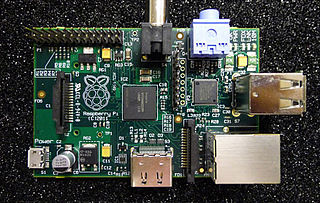Raspberry Pi: Difference between revisions
Alen ribic (talk | contribs) (→Links) |
(→Current Issues: Added "model B boards have 512 MB on board") |
||
| Line 34: | Line 34: | ||
== Current Issues == | == Current Issues == | ||
The main issues encountered so far is the memory limitations of the device, at | The main issues encountered so far is the memory limitations of the device, at 256 MB [[GHC]] will execute fine, but problems will start to arise when using [[cabal-install]] to install new libraries, especially ones with lots of dependencies. Recent model B boards have 512 MB on board [http://www.raspberrypi.org/archives/2180]. | ||
Potential solutions to this problem have been suggested, including using [http://wiki.qemu.org/Main_Page QEMU] on a more powerful system and thus compiling your application there and copying the resulting binary across to your Raspberry Pi | |||
== See also == | == See also == | ||
Revision as of 12:03, 23 October 2012
This article is a stub. You can help by expanding it.
Introduction
Raspberry Pi is an ARM based single-board computer, developed for educational purposes, costing USD 25. For more details, see the Wikipedia article about Raspberry Pi, or the FAQ list.
Links
GHC Status
Of the "official" images currently available from the Raspberry Pi Downloads page, the following versions of GHC are available
Note: GHCi does not currently work on ARM below version 7.4.2. See this post on haskell-cafe for information on this
djhuk has been able to compile and install GHC-7.4.2 via QEMU to the Raspberry Pi but there still seems to be some work to do.
Current Issues
The main issues encountered so far is the memory limitations of the device, at 256 MB GHC will execute fine, but problems will start to arise when using cabal-install to install new libraries, especially ones with lots of dependencies. Recent model B boards have 512 MB on board [1].
Potential solutions to this problem have been suggested, including using QEMU on a more powerful system and thus compiling your application there and copying the resulting binary across to your Raspberry Pi
